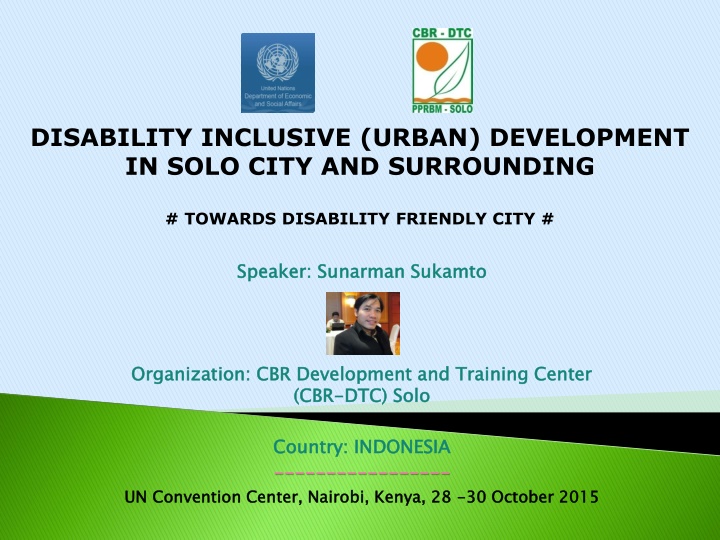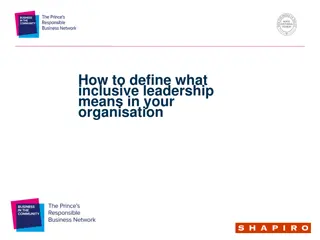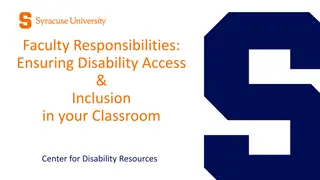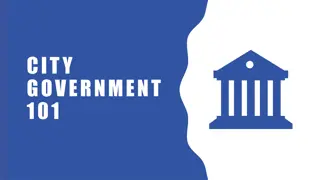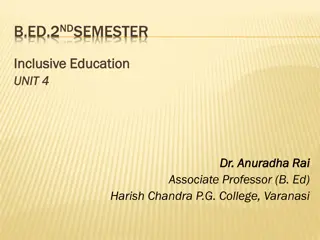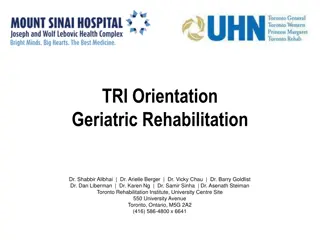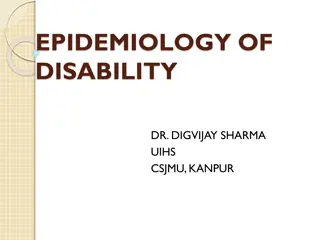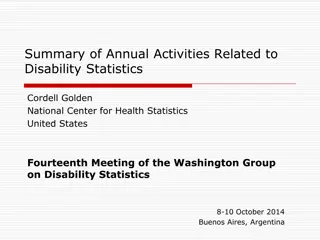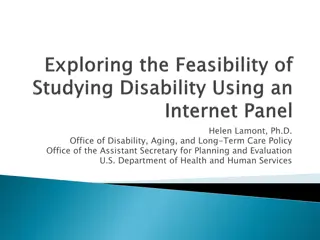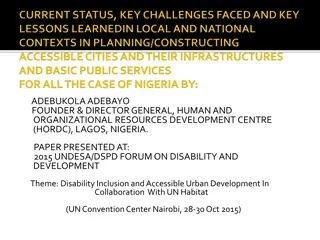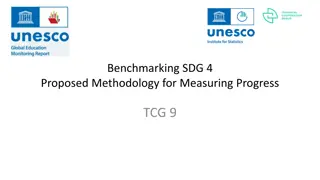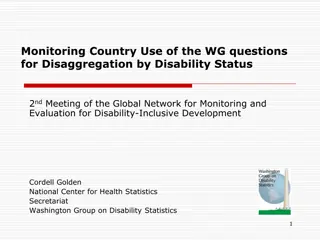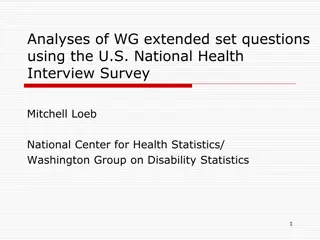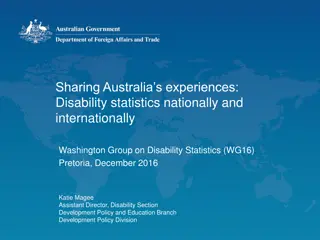Progress of Disability Inclusive Development in Solo City and Surrounding Areas
PWDs in Solo City face stigma and discrimination, with women and children experiencing abuse. Initiatives like Disability Advocacy Team and Self-Help Groups aim to strengthen participation and rights of PWDs. Progress has been made with regulations, accessibility standards, education, employment, and health insurance inclusion.
Download Presentation

Please find below an Image/Link to download the presentation.
The content on the website is provided AS IS for your information and personal use only. It may not be sold, licensed, or shared on other websites without obtaining consent from the author.If you encounter any issues during the download, it is possible that the publisher has removed the file from their server.
You are allowed to download the files provided on this website for personal or commercial use, subject to the condition that they are used lawfully. All files are the property of their respective owners.
The content on the website is provided AS IS for your information and personal use only. It may not be sold, licensed, or shared on other websites without obtaining consent from the author.
E N D
Presentation Transcript
DISABILITY INCLUSIVE (URBAN) DEVELOPMENT IN SOLO CITY AND SURROUNDING # TOWARDS DISABILITY FRIENDLY CITY # Speaker: Speaker: Sunarman Sukamto Sunarman Sukamto Organization: Organization: CBR Development and Training Center (CBR CBR Development and Training Center (CBR- -DTC) Solo DTC) Solo Country: ----------------- Country: INDONESIA ----------------- INDONESIA UN Convention Center, Nairobi, Kenya, 28 UN Convention Center, Nairobi, Kenya, 28 - -30 October 2015 30 October 2015
Why Disability Inclusive Development (Main Issues in the context of Solo City and surrounding) : PWDs (including whom with mental health / psicosocial disability and affected by leprosy) experience stigma and discrimination in all aspect of life and all sectors of development in their daily life. Women and children with disability experience multiple abuse and exploitation in many forms. The system and structure of the massive developments marginalize PWDs. 1. 2. 3. How Disability Inclusive Development (Context of Solo City and Surronding) : In Policy Making Level (Main Strategy) : Strengthen the Local Government Structure and System through Establishment the Disability Advocacy Team (DAT) with the Local Government Departments / Office / Units. The DAT has reguler coordination meeting to develop program and budget to reasonable accomodate the disability rights in the development agendas of local government (cross-cutting issues). In Grassroots Level (Main Strategy) : Strengthen the Full and Effective Participation of PWDs in the System and Structure of Local Government through Establishment of many Self-Help Groups of PWDs. Some SHGs unite to be DPO. The leaders of the SHGs / DPOs Involve and Influence the System and Structure of Local Government. 1. 2. 1. 2.
The Progresses as 2015 : Local Regulations on Disability Rights are Created and Enforced. Base Line Data and Mappping of PWDs are Continously Developed. CBR and inclusive development principles are adopted. Standard of accessibility is applied. Students with disabilities (physical, visual, hearing, intellectual, autism) participatte in more than 500 reguler schools nearest to their home (quantitative and qualitative in progress). Disability Advocacy Team (DAT) is functioning as coordination mecahnism to mainstream disability rights into their annual (on going) program and budget (cross- cutting and multi sectors). SHGs / DPOs are active in local government structure and system (development planning in all level, regulation / policy making, and political agendas). More than 200 houses of PWDs to be renovated by using government budget. More than 200 PWDs works in more than 50 companies with reasonable standard of income and protection (equal with other non PWDs). About 50% of 69.000 PWDs include in health insurance.
The Progresses as 2015 (Continue...) : More public services and facilities are accessible (quantitative and qualitative in progress). Abuse and exploitation issues of women and children with disabilities are continously addressed to ensure social protection and legal justice. Program and budget for disability are increased (quantitative and qualitative). Solo and other Districts surrounding Solo are declared as Inclusive City or Disability Friendly. Sign language is accepted and promoted. Solo City operates and ensures about 60 bus shelters, 30 rapid transit busses, three railway stations, 54 traffic lights, four pelican crossings, four city walks, its tourism bus and airport are accessible. Modified motorcycles, driving license, and accident insurance for persons with disabilities.
The Main Challenges : National Government Level : 1. There is Human Right National Action Plan, however requires political will and commitment. 2. Has not been a priority issue, remain seen as a social area. 3. Rehabilitation concept is not optimal; should be the issue of the development of all sectors (multi stakeholder). 4. Data and mapping of PWDs is confusing / overlapping. Local Government Level : Local government staffs are vulnarable to move to other department / unit. Disability is seen as development issues; however political interest is dominant. 1. 2. Grassroots Level : Need time in capacity and character building of the leaders among PWDs. Practical needs orientated is still dominant among PWDs. 1. 2.
Accessibility Monitoring by SHGs / DPOs Followed by Problems Solving Meeting Attended by Relevant Multi Stakehodlers Accessibility Monitoring by SHGs / DPOs Followed by Problems Solving Meeting Attended by Relevant Multi Stakehodlers
Example of Accessibility of Bus Shelter Example of Accessibility of Bus Shelter 7
Thank you... See you... Thank you... See you...
CBR DTC Solo at Glance CBR DTC Solo was established in 1978 started to develop CBR concept as approach to disability issues in many rural areas. The ideas were proved successful in reaching and serving the persons with disabilities, particularly children with disability living in rural areas. Many CBR programs were implemented in many villages. Taking into account the lesson learn of the long experiences of CBR implementation from 1978 2008 (30 years), the CBR DTC Solo since 2009 develop a metamorphose from village based CBR movement into advocacy model of CBR. Start from 2010, a massive advocacy to involve and influence the government system and structure has begun. Disability Advocacy Team (DAT), as the methamorphoses of CBR team, has initiated in many local governments with the UNCRPD and New CBR Guidelines as the main spirit and values to accomodate disability issues into cross-cutting issues in development. CBR DTC Solo has progressive organizational development alongwith the massive advocacy of the rights of PWDs in Indonesia and beyond. Address of CBR DTC Solo: Mendungan RT. 001 RW. 005 No. 29 Pabelan, Kartasuro, Sukoharjo, Solo (57162) Phone / Fax.: +62 271 7653029 Email : maman_shg@yahoo.com / mamansun@gmail.com / cbr.centersolo@gmail.com Web.: www.pprbmsolo.org
Sunarman Sukamto Sunarman Sukamto He is active in disability movement since he was a student. He is now the director of CBR Development and Training Center (CBR DTC) Solo. He is advocacy committee of Indonesia CBR Alliance. He is also the deputy chairman of Asia Pacific CBR Network. He is active in disability movement since he was a student. He is now the director of CBR Development and Training Center (CBR- - DTC) Solo. He is advocacy committee of Indonesia CBR Alliance. He is also the deputy chairman of Asia Pacific CBR Network.
